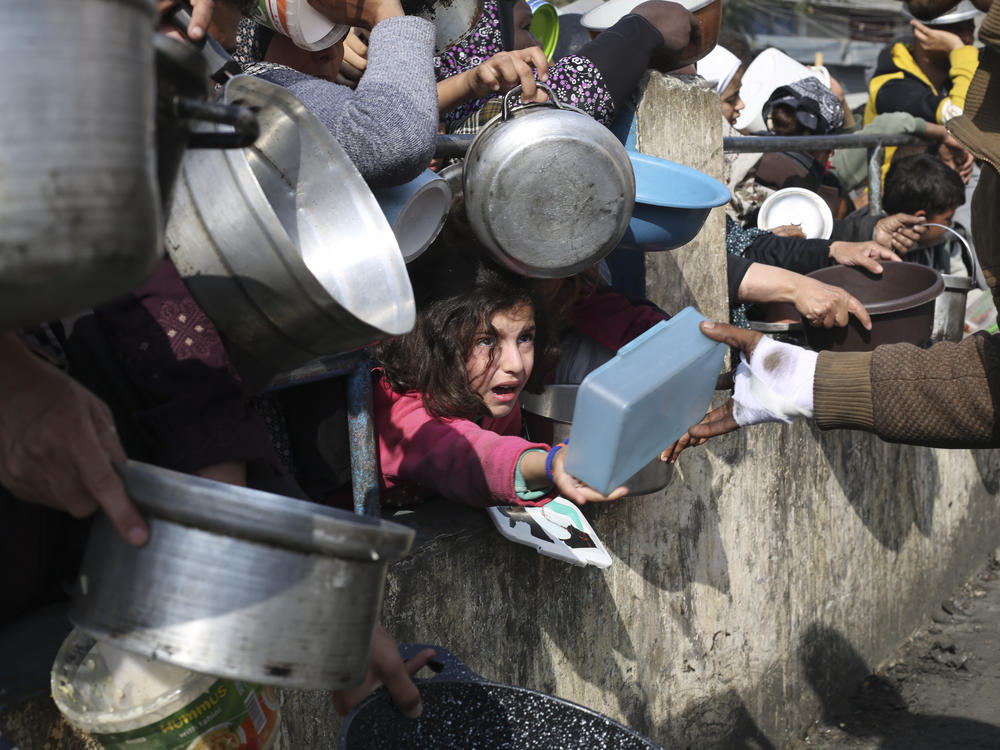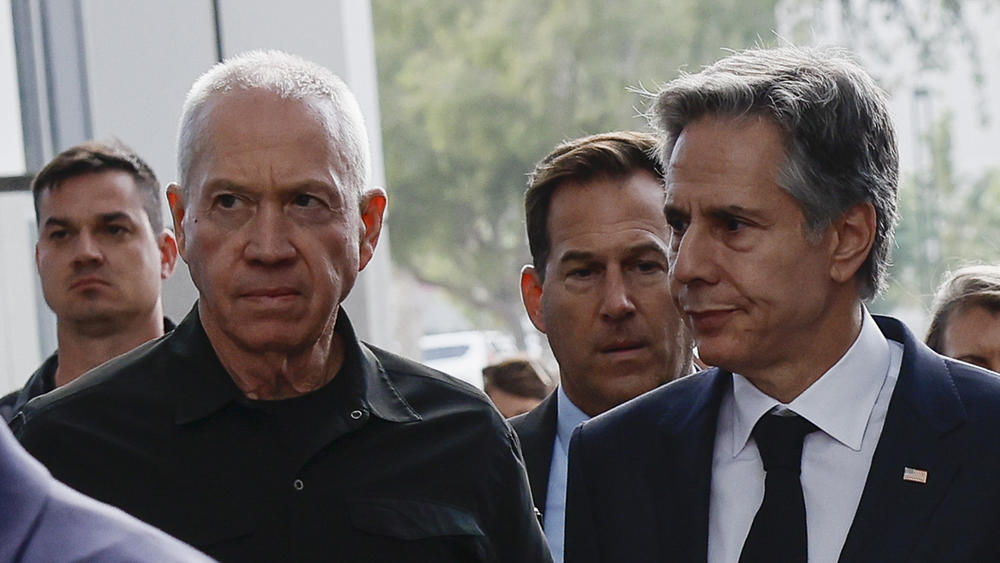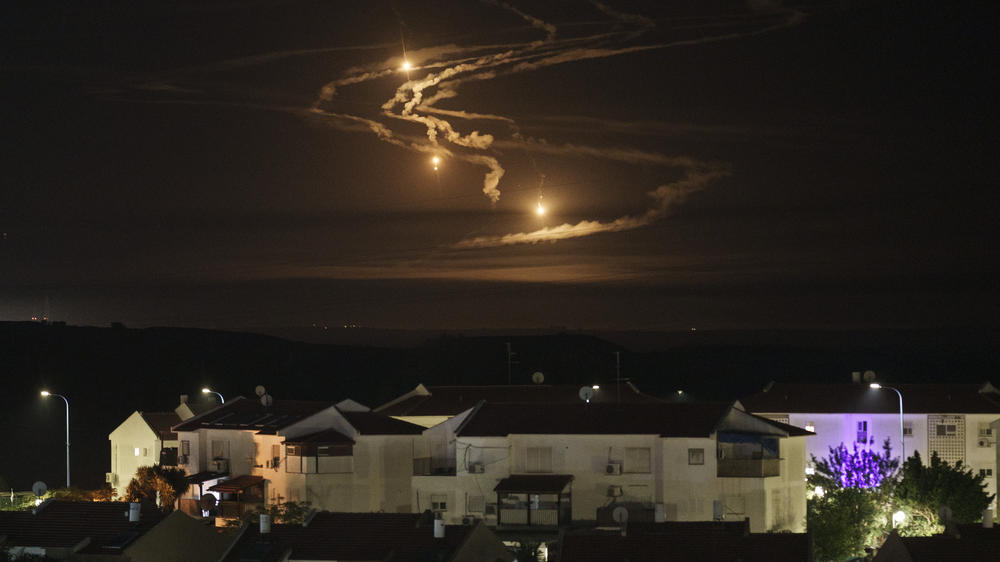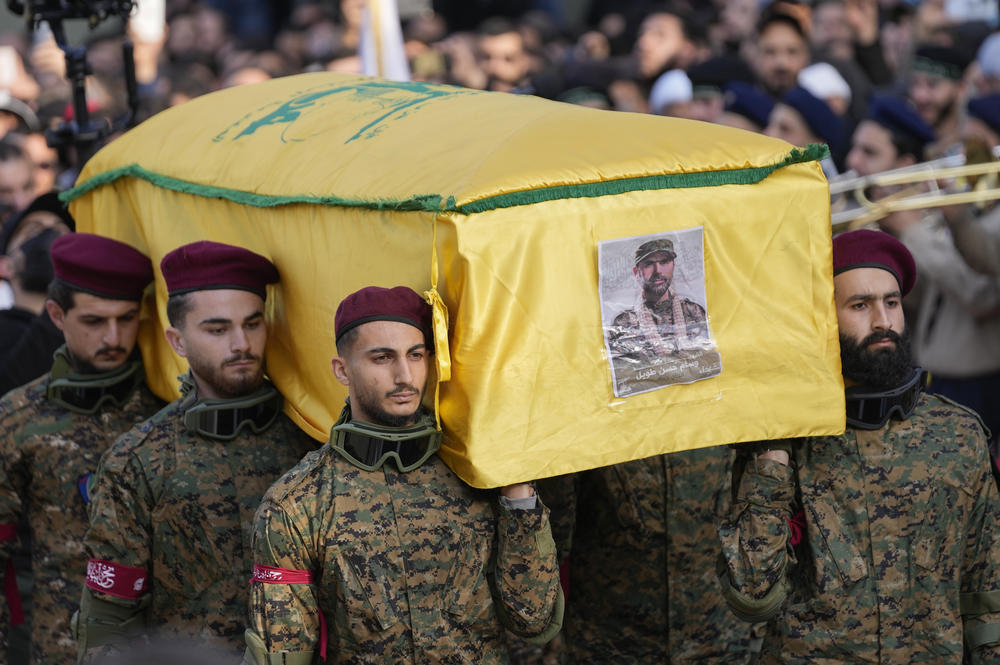Section Branding
Header Content
In Israel, Blinken looks to planning for a post-war Gaza as bombardments rage on
Primary Content
Updated January 9, 2024 at 1:07 PM ET
TEL AVIV, Israel — U.S. Secretary of State Antony Blinken faced tough talks with Israeli leaders on Gaza's post-war future Tuesday, while Israel's military pushed ahead with its offensive in the beleaguered territory, including heavy bombardment and fighting that shook refugee camps.
The fighting sent Palestinians scrambling to find safety and hampered aid groups' efforts to get relief to the population.
Blinken said he had promises from four Arab nations and Turkey to help rebuild Gaza after the war. But those nations also want to see an end to the fighting in Gaza and concrete steps toward the eventual creation of a Palestinian state alongside Israel, something Israel Prime Minister Benjamin Netanyahu has vowed not to allow.
The U.S. and Israel also remain deeply divided over how Gaza will be run when — and if — its current Hamas rulers are defeated. American officials have called for the Palestinian Authority, which currently governs parts of the Israeli-occupied West Bank, to take the reins in Gaza. Israeli leaders have rejected that idea but have not put forward a concrete plan beyond saying they will maintain open-ended military control over the territory.
At the same time, Blinken is trying to prevent an all-out war between Israel and Lebanon's Hezbollah. After an Israeli strike last week hit Beirut, killing Hamas's deputy leader, the two sides have stepped up their exchanges.
"There is lots to talk about, in particular about the way forward," Blinken said after meeting Israeli President Isaac Herzog.
On Tuesday, Hezbollah said its exploding drones targeted the Israeli army northern command in the town of Safed — deeper into Israel than previous fire by the group. The Israeli military said a drone fell at a base in the north without causing damage, suggesting it had been intercepted. Military officials did not identify the base.
After three months, fierce battles continue
The United States has pressed Israel to scale down its offensive in Gaza to more precise operations targeting Hamas. But the pace of death and destruction has remained largely the same, with several hundred Palestinians killed each day, according to health officials in Gaza.
Israel has vowed to keep going until it destroys Hamas throughout the territory, in response to the attack on Oct. 7, when militants killed some 1,200 people, mainly civilians, in southern Israel and kidnapped around 250 others.
Still, after three months of fighting, Hamas continues to put up a fierce fight.
The Israeli military says it has dismantled Hamas infrastructure in northern Gaza, where large swaths of the cityscape have been demolished. But fighting continues there against what Israel says are pockets of militants. The offensive's focus has shifted to the southern city of Khan Younis and a number of urban refugee camps in central Gaza.
"The fighting will continue throughout 2024," military spokesman Daniel Hagari said.
Since the war began, Israel's assault in Gaza has killed more than 23,200 Palestinians, roughly 1% of the territory's population, and more than 58,000 people have been wounded, according to the Health Ministry in Hamas-run Gaza. About two-thirds of the dead are women and children. The death toll does not distinguish between combatants and civilians.
Throughout the night and into Tuesday morning, warplanes struck multiple areas in and around Khan Younis and in central Gaza, where 57 dead and dozens of wounded were brought into the main hospital in the town of Deir al-Balah.
Heavy fighting centers on a refugee camp in central Gaza
One strike late Monday hit a house in Deir al-Balah, killing the mother, three daughters and three small grandchildren of Jamal Naeim, a well-known dentist in Gaza. Outside the hospital, Naeim cradled a small bundle of white cloth the size of an infant containing all that was left of one of his adult daughters, Shaimaa, who was also a dentist.
"This is Dr. Shaimaa, 27 years old. This is what we found of her, just the skin of her head and her hair," he said, breaking into sobs. Naeim is the brother of Bassem Naeim, a political figure in Hamas, but is not a member of the group himself, residents said.
Israeli troops have been pushing into several urban refugee camps near Deir al-Balah, fighting with militants and pounding the densely built districts with heavy airstrikes and shelling. The camps were built to house Palestinians driven out of homes during the 1948 war surrounding Israel's creation. Over time, the camps grew into towns.
Monday was one of the deadliest days yet for Israeli troops in Gaza, with nine killed, according to the military. Six of them died in a blast that went off when forces were bringing explosives into an underground area in Bureij camp, apparently to blow up Hamas tunnels, Israeli media reported.
The military declined to comment. It says 185 soldiers have been killed since the ground offensive began in late October.
Nearly 85% of Gaza's population of 2.3 million have been driven from their homes by the fighting, and a quarter of its residents face starvation, with only a trickle of food, water, medicine and other supplies entering through an Israeli siege.
U.N. reiterates alarm on food and water shortages
The U.N. humanitarian office, known as OCHA, warned that the fighting was severely hampering aid deliveries. Several warehouses, distribution centers, health facilities and shelters have been affected by the military's evacuation orders, it said.
Some bakeries in the central city of Deir al-Balah have been forced to shut down. A U.N. warehouse was hit last week, killing a staffer, and five other staffers were detained by the military, with two still held.
The situation is even more dire in northern Gaza, which Israeli forces cut off from the rest of the territory in late October. Tens of thousands of people who remain there face shortages of food and water.
The World Health Organization has been unable to deliver supplies to the north for two weeks. OCHA said the military rejected five planned aid convoys to the north over that period, including deliveries of medical supplies and fuel for water and sanitation facilities.
In Israel's north, exchanges with Hezbollah intensify
As Blinken arrived in Israel, exchanges between Israel and Hezbollah continued their spiral since last week's killing of Hamas deputy leader Saleh Arouri in Beirut.
Hezbollah said its drone strike on the base in northern Israel on Tuesday was further retaliation for the killing of Arouri and of a senior Hezbollah commander in an Israeli bombing Monday.
On Tuesday morning, an Israeli drone hit a car in southern Lebanon, killing three people inside, security officials in the area and the state news agency said. There was no immediate word on the identities of the three.
Israel has repeatedly warned that time is running out before it launches a campaign to end militants' fire across the border.
U.S. officials have said they expect Blinken's discussions with Netanyahu, the War Cabinet and other officials to be some of the most difficult on his current Mideast tour, his fourth since the war began.
Blinken said Monday that Saudi Arabia, Jordan, Qatar, the United Arab Emirates and Turkey agreed to begin planning for the reconstruction and governance of Gaza once Israel's war against Hamas ends. Those countries previously resisted U.S. calls for post-war planning to begin, insisting that there must first be a cease-fire and a sharp reduction in the civilian suffering in Gaza.
Copyright 2024 NPR. To see more, visit https://www.npr.org.




